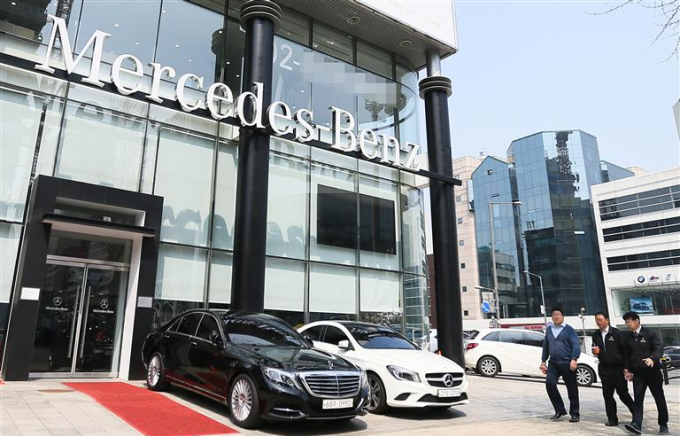Automobile sales
Tax cuts, pandemic lift imported car sales in Korea
By Dec 03, 2020 (Gmt+09:00)
2
Min read
Most Read
LG Chem to sell water filter business to Glenwood PE for $692 million


Kyobo Life poised to buy Japan’s SBI Group-owned savings bank


KT&G eyes overseas M&A after rejecting activist fund's offer


StockX in merger talks with Naver’s online reseller Kream


Mirae Asset to be named Korea Post’s core real estate fund operator



Imported car sales in South Korea are on track to post a record high this year, benefiting from consumption tax cuts aimed at stimulating personal spending, according to the Korea Automobile Importers and Distributors Association (KAIDA) on Dec. 3.
Growing awareness about personal health and hygiene also drove car ownership, with surging home prices and no overseas travel prompting the younger generation to open their wallets for coveted cars.
In November alone, 27,436 imported cars were sold in South Korea, the largest monthly import sales so far this year. That represented a 7.5% rise from a year earlier.
Between January and November of this year, a total of 243,440 imported cars were registered in the country, up 13.4% year on year. Based on the 11-month number, the country's imported car sales for full-year 2020 are poised to break the annual 260,705-unit record set in 2018.
South Korea had slashed the consumer spending tax levied on cars to 1.5% from 5% between March and July, in an aim to reinvigorate consumer spending.
Since July, the consumption tax rate has been lifted to 3.5% but the government abolished the cap on tax benefits, which had been set at 1 million won ($913) per purchase.
That means generous tax incentives for high-priced import car buyers. A buyer of an Italian luxury brand Lamborghini of over 300 million won ($273,473), for example, would benefit from a consumption tax cut of as much as 3.5 million won.
“Imported cars have gained popularity as the younger generation are buying any car they want, following the recent surge in home prices,” said an automobile industry source.
LUXURY, AFFORDABILITY
By brand, luxury car Mercedes-Benz of Germany’s Daimler AG topped the list with accumulated sales of 69,712 units between January and November. BMW ranked second with sales of 39,061 units during the same period, with Audi racking up sales of 9,628 units.
Including Tesla’s electric cars -- tallies of which the association does not compile -- total car imports to South Korea are estimated to reach 300,000 units this year. According to Carisyou, a Korean car sales platform, Tesla has sold a combined 11,601 units in South Korea between January and November this year.
Another German brand Volkswagen has been expanding its foothold in Korea with a broader selection, including affordable models such as the Jetta compact, as well as the best-selling sedan Passat GT.
As of last year, 23.7 million cars were registered in the country, representing one car for every two South Koreans.
Write to Sun A Lee at suna@hankyung.com
Yeonhee Kim edited this article.
More to Read
-
 Business & PoliticsTrump Jr. meets Korean business chiefs in back-to-back sessions
Business & PoliticsTrump Jr. meets Korean business chiefs in back-to-back sessionsApr 30, 2025 (Gmt+09:00)
-
 Korean chipmakersSamsung in talks to supply customized HBM4 to Nvidia, Broadcom, Google
Korean chipmakersSamsung in talks to supply customized HBM4 to Nvidia, Broadcom, GoogleApr 30, 2025 (Gmt+09:00)
-
 EnergyLS Cable breaks ground on $681 mn underwater cable plant in Chesapeake
EnergyLS Cable breaks ground on $681 mn underwater cable plant in ChesapeakeApr 29, 2025 (Gmt+09:00)
-
 Business & PoliticsUS tariffs add risk premium to dollar assets: Maurice Obstfeld
Business & PoliticsUS tariffs add risk premium to dollar assets: Maurice ObstfeldApr 29, 2025 (Gmt+09:00)
-

Comment 0
LOG IN


